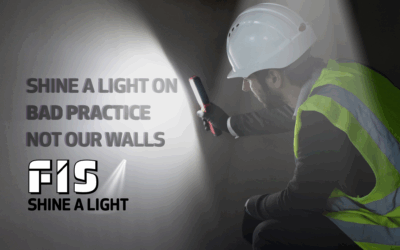
by Clair Mooney | 7 Apr, 2022 | Main News Feed
The
latest information from Builders’ Conference shows that 490 contracts worth £5.8 billion were awarded in March. Whilst the number of contracts increased for the third month in a row, the value dipped again but was only just below the monthly average for the past year (£6.1 billion). 69% of all the contracts awarded by value were in the private sector. Overall, there were 161 housing projects worth £1.9 billion (34%), the largest of which was a £350 million project to build 30 residential units with a swimming pool and gymnasium in Westminster; 62 office projects totalling £1.1 billion (19%); and 57 education projects worth £567 million (10%).
The number of tender opportunities (359) was slighter higher than the previous month (352) but still 43% below the monthly average for the past year.

by Clair Mooney | 7 Apr, 2022 | Insurance
Companies from across the industry are being asked to take part again in what was, last year, the biggest ever review of construction’s growing professional indemnity insurance crisis.
The survey was carried out last year in response to firms from across the industry reporting sharp increases in premiums for PI insurance, while also seeing stricter curbs on the levels of cover.
Over 1,000 firms responded to the survey last year and findings included:
• Premiums had increased nearly four-fold at last renewal, having doubled the year before;
• Although most respondents said that less than 5% of their work related to high rise residential buildings, almost one in three were unable to buy the cover they wanted or needed; and
• Over 60% had some form of restriction on cover relating to cladding or fire safety and over a quarter of respondents said they had lost jobs as a result of inadequate PII, with one in three unable to carry out necessary cladding remedial work if they wanted to.
The Construction Leadership Council is seeking an even greater response this year to continue to provide government with data to support the construction industry’s request for help in this area, particularly among the SME sector and to address the slowing pace of necessary remedial work.
The survey is entirely confidential and companies from across the built environment are encouraged to participate at: https://www.surveymonkey.co.uk/r/7CJMDG8
Construction Leadership Council Professional Indemnity Insurance Group lead Samantha Peat said: “The construction industry is heading into another difficult period with the cost of energy and building supplies increasing and our sense is that the problems around PII cover for cladding and fire safety are no better.”
“We are continuing to engage with the UK Government and insurers to find ways to help businesses that could otherwise face an uncertain future due to the nature of their PI renewals. We want businesses from across the industry to give us their views – whether you are affected or not – to help us shape the way we prepare a response from the whole sector.”
CLC chair Andy Mitchell said: “We have seen over the course of the pandemic that our industry can work together effectively to tackle the problems facing the construction sector. Given the feedback from across the sector about the difficulties faced by companies in obtaining PI insurance and the beneficial output from the previous survey’s responses, I strongly encourage companies to contribute to this year’s survey.”
The survey will be live until 29 April 2022. Industry-level details of the results will be published by the Council and will be used to inform ongoing work to support the sector.

by Clair Mooney | 6 Apr, 2022 | Main News Feed
The City of London Corporation has unveiled a new Skills for a Sustainable Skyline Taskforce which will look at defining and addressing skills gaps around the construction, retrofit and maintenance of low carbon commercial buildings in Central London boroughs.
The taskforce will run for three years and will be chaired by Deputy Chairman of the City Corporation’s Policy and Resources Committee, Chris Hayward. City Property Association (CPA)’s Chief Executive, Charles Begley, will serve as Deputy Chair.
FIS Chief Executive Iain McIlwee has a place on the Strategy Steering Board, which will support the Taskforce Chair, Chris Hayward CC, and Taskforce Deputy Chair, Charles Begley, in shaping the Taskforce’s strategic outputs and influence. Working in collaboration, they will ensure that the Taskforce addresses skills gaps relating to low carbon commercial buildings across Central London.
It comes in response to the findings of a poll of over 100 industry professionals which revealed:
- 91% said the commercial built environment sector lacks sufficient skilled workers to achieve net zero targets;
- 80% believed a lack of workplace diversity is an issue for the sector; and
- 87% agreed that there is a growing ‘green skills’ gap in the commercial built environment.
The taskforce will support the aims of the City Corporation’s radical Climate Action Strategy which commits to net-zero carbon emissions across the City Corporation’s operations by 2027, and to support the achievement of net zero for the Square Mile by 2040.
It will bring together leaders from across the commercial built environment, including representation from local authorities, central Government, employers, industry bodies and training providers.
Chair of the Skills for a Sustainable Skylines Taskforce and Deputy Chair of the City Corporation’s Policy and Resource Committee, Chris Hayward, said:
“Central London urgently needs a larger skilled workforce to decarbonise its commercial buildings and this taskforce will lead the way in finding solutions to fill this skills gap.
“We must work at pace to attract new talent as well as upskill and reskill the existing workforce as we look to meet our ambitious climate action goals.
“The areas which we have identified as having the greatest scope for improvement are the full development lifecycle, including design, retrofit, construction and maintenance.”
Deputy Chair of the Skills for a Sustainable Skylines Taskforce and Chief Executive of the City Property Association, Charles Begley, said:
“Advances in technology and innovation are opening up a wider range of job opportunities within the built environment, with the drive towards greater sustainability being embedded from financing to fit-out, as well as the long term operation of a building. However, there is evidence of a growing skills gap which threatens to impede progress in achieving London’s net zero carbon targets.
“We need to understand the barriers in attracting the diverse workforce the industry requires, and find solutions to help promote the reskilling and upskilling of existing workers, whilst raising career awareness amongst Londoners, particularly those from underrepresented demographic backgrounds.”
The taskforce’s Strategy Steering Board, which will be responsible for defining the overall strategy, influence and outputs, is made up of the following 15 industry leaders:
- Bola Abisogun OBE, Founder & Chairman, DiverseCity Surveyors
- Tim Balcon, Chief Executive Officer, Construction Industry Training Board
- Julia Barrett, Chief Sustainability Officer, Willmott Dixon
- David Frise, Group Chief Executive Officer, Building Engineering Services Association (BESA) and Member of Executive Group, Actuate UK
- Martin Gettings, Vice President – Portfolio Management, Real Estate, Brookfield
- Alison Gowman, Trustee, Trust for London
- Emma Hoskyn, UK Head of Sustainability, JLL
- Sir Stuart Lipton, Co-Founder and Partner, Lipton Rogers
- Carol Lynch, Chief Executive, Construction Youth Trust
- Iain McIlwee, Chief Executive Officer, Finishes and Interiors Sector (FIS)
- Fiona Morey, Pro Vice-Chancellor (Compulsory and Further Education), London South Bank University
- Benjamin O’Connor, Director, New London Architecture
- Stephen Pomeroy, Founder and Chief Executive, BECG
- Hannah Vickers, Chief of Staff, Mace
- Danna Walker, Founder, Built By Us
After 2025, the taskforce is expected to share the research and lessons learned with other UK regions which have high concentrations of commercial buildings – including Birmingham, Cardiff, Manchester and Glasgow.

by Clair Mooney | 4 Apr, 2022 | Main News Feed
2022 is set to be another busy year for key updates and changes to Employment Law, including the introduction of the long-waited ‘Employment Bill’ – which is set to be the biggest review of workplace employment rights in over 20 years. FIS Associate Member Citation has put together an exclusive guide, including the Employment Bill, backdated holiday pay for self-employed workers, and the end of self-isolation.
Download your copy at https://tinyurl.com/fiselupdate22
FIS member benefit
If you’d like to chat about how Citation can help with the HR and Health & Safety side of your business, just give them a call on 0345 844 1111, or fill in their call-back form and they’ll get right back to you. Please quote ‘The Finishes and Interiors Sector’ when enquiring to access your member benefit and preferential rates.

by Clair Mooney | 1 Apr, 2022 | Skills
FIS and The Worshipful Company of Plaisterers have joined forces to expand on the Plaisterers’ Training Awards, which traditionally covered plastering and drylining, to encompass the wider finishes and interiors sector. The new Training Awards will now recognise outstanding individuals and contributions made to recruiting, training and developing people in plastering and interior trades.
Commenting on the expansion of the awards, FIS President Helen Tapper and Member of The Worshipful Company of Plaisterers Industry Committee said:
“When looking at the skills shortages that have impacted our sector in recent times, it often belies the effort that businesses, training providers and individuals are making. FIS and the Plaisterers are both committed to encouraging people to join the industry and a focus on continuous learning and development.
“People talk about competence and that is vital, but so too is pride in what we do – our work is the stuff that makes structures and shells into homes, hospitals, workplaces and inspiring educational settings. The people that do this are skilled craftspeople and more needs to be done to recognise this, both within and beyond our sector. We have a proud tradition, but a bright future too and this initiative is about two of our key institutions working together to help us to identify, celebrate and learn from the people who are building this future.”
The awards categories will acknowledge individuals, employees, students, apprentices, independent training providers and colleges who have made an exceptional contribution to learning and development in the sector.
The 2022 award categories are:
- Student of the Year – Plaisterers Award for Plastering Trades
- Student of the Year – FIS Award for Interior Trades
- Apprentice of the Year – Plaisterers Award for Plastering Trades
- Apprentice of the Year – FIS Award for Interior Trades
- Colleges and Independent Training Providers (large)
- Colleges and Independent Training Providers (small)
- FIS Member Training Programme
- Mentors Award
- Lifetime Achievement Award
As well as trade specific sponsored awards:
- British Gypsum Trophy (independent training provider/college drylining)
- Saint Gobain Formula Trophy (Fibrous/GRG can be any organisation or person)
The awards will officially open for entries on the 31 March and close mid-August. The winners will be announced at a ceremony at Plaisterers’ Hall on 22 November.
Master of The Worshipful Company of Plaisterers Margaret Coates commented:
“Our aim is to create with FIS a Training Awards event that showcases the very best of the sector’s occupations, that both encourages and inspires others to do more. The skills shortage is profound. We must address this, by attracting people to the plastering and interior trades and by promoting excellent training providers and supportive employers.
“A vibrant construction industry is crucial to a strong economy and our sector plays an important role. We look forward to working with FIS not just in rewarding and celebrating success but finding and telling the stories that inspire others to join or invest in those people who will lead our amazing sector forwards. We urge and encourage you to enter this collaborative competition and to tell your story.”
For more details on entering these awards visit www.thefis.org/training-awards-2022
For further information or for any questions please contact FIS at info@thefis.org or call 0121 707 0077 or The Worshipful Company of Plasiterers on clerk@plaistererslivery.co.uk or call 0207 7964333.
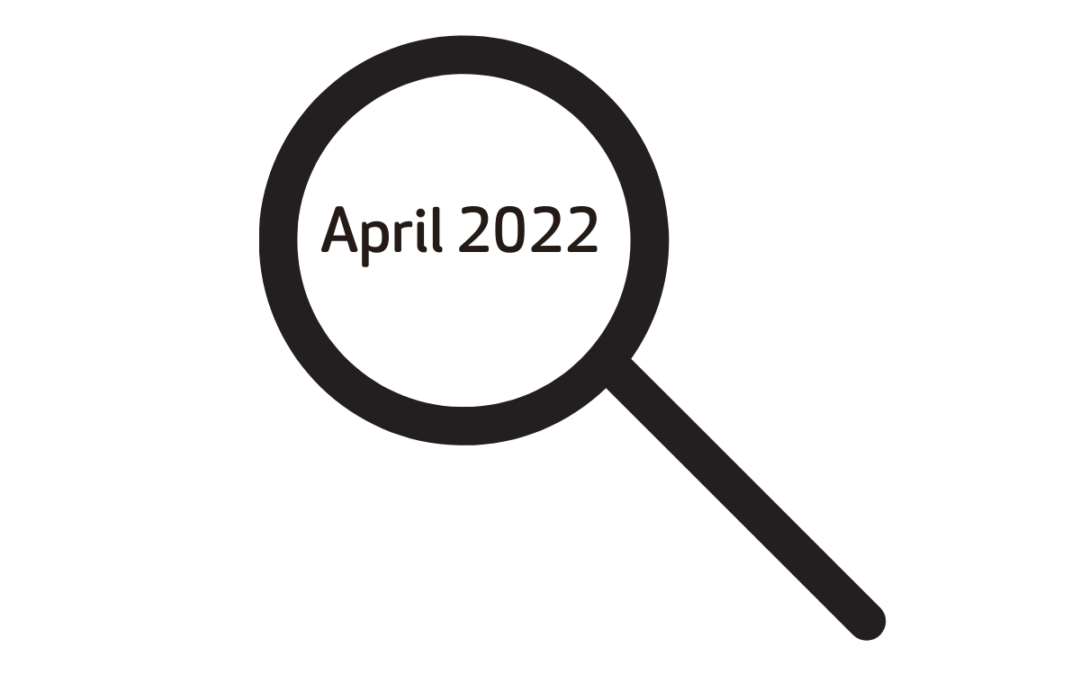
by Clair Mooney | 31 Mar, 2022 | Main News Feed
April sees a number of legislative and tax changes come into effect, we’ve included details in below to remind members and ensure they are complying.
Minimum wage rates
From 1 April, the National Living Wage will increase to £9.50 per hour, whilst the National Minimum Wage will rise to £9.18 for 21‐22 year olds, £6.83 for 18‐20 year olds, and £4.81 for 16‐17 year olds. The Apprentice Rate will also increase to £4.81.
End of Red Diesel rebate
From 1 April the entitlement to use rebated red diesel will be removed from most sectors, including construction, which means it will be illegal to put red diesel into the tank of a vehicle or machine being used for construction work. If HMRC finds traces of red diesel in such a vehicle or machine, it will ask for evidence to demonstrate that it was put in before the rules changed and is still being used up. HMRC has confirmed it will take a pragmatic approach to enforcement in this situation but can seize the vehicle or machine and issue a fine of £250. To help members manage this significant change, Build UK has published a series of Frequently Asked Questions covering the transition from red to white diesel which includes a checklist of the steps to take.
New Plastic Packaging Tax
The Plastic Packaging Tax comes into force on 1 April 2022 and will be charged at a rate of £200 per tonne. The CPA has produced a briefing paper on the effects of this new tax.
Gender pay gap deadline
Companies with 250 employees or more have until Monday 4 April to report their gender pay gap information for 2021/22. Employers that fail to report on time or report inaccurate data via the gender pay gap service could face enforcement action.

by Clair Mooney | 31 Mar, 2022 | Health and Safety
Personal Protective Equipment at Work Regulations will be amended from 6 April 2022 to ensure that agency and temporary workers ‐ so called limb (b) workers ‐ are provided with the same PPE protections as employees. Those who have self‐employed status are not included and the HSE has published interim guidance to help employers prepare.
The definition of self-employed here has created some confusion, with the guidance stating:
Generally, workers who come under limb (b):
- carry out casual or irregular work for one or more organisation
- after 1 month of continuous service, receive holiday pay but not other employment rights such as the minimum period of statutory notice
only carry out work if they choose to
- have a contract or other arrangement to do work or services personally for a reward (the contract doesn’t have to be written) and only have a limited right to send someone else to do the work, for example swapping shifts with someone on a pre-approved list (subcontracting)
are not in business for themselves (they do not advertise services directly to customers who can then also book their services directly)
Many in the sector may be unfamiliar with the definition of a limb (b) worker. Commenting on the guidance Ian Cole-Wilkins, CEO of Indigo, who have 15 years’ experience of providing subcontractor contracting services to the construction sector, advised that
“In the first place it is important to recognise that anything that improves workplace health and safety should be welcomed. FIS members may be unclear on the technical elements of the guidance published by the HSE and for good reason as the HSE appear to have merged [albeit with good intentions] the legal status of limb [b] workers and added to the mix S44 ITEPA esque considerations with their position of “those that are self-employed for legal and tax purposes”. They appear to have omitted the word “just” or “only” and not fully understood that you simply cannot invent a new class of “worker” without much wider consideration.
Despite the clumsiness, the intention is to be welcomed and I believe that they are primarily trying to ensure that the lower paid, predominantly agency workers who are engaged on hybrid models, don’t pay for PPE. Those that are truly self-employed, that can display there is no requirement for personal service, or there is lack of mutuality of obligation or there is no significant control will not fall within the PPER 2022 provisions. It is therefore important for FIS members to ensure they and their suppliers have assessed the status of their subcontractors and wider labour force in the correct manner. We would be glad to assist any FIS member with a free, no-obligation assessment of their workforce status to provide reassurance around compliance with the 6 April PPE requirements.”
FIS has provided additional guidance to support members in implementing this change here: https://www.thefis.org/2022/03/11/ppe-regulations-to-be-extended-to-all-workers/

by Clair Mooney | 31 Mar, 2022 | Main News Feed
The Construction Leadership Council has published a document intended to support UK firms respond to the impacts of the current crisis in Ukraine.
Companies from across UK construction have reported emerging challenges that have arisen because of the conflict, including escalation in costs for materials and energy.
In response, the CLC has drawn together Industry response to the Ukraine Crisis. Guidance Note 1, which provides expert guidance to outline the practical steps that all parts of the industry can take to mitigate the market impacts.
As with its response to the Covid crisis, the CLC guidance reminds of the importance of early engagement and collaboration to secure both existing and planned projects. It also provides dedicated checklists for different types of organisation including clients, main contractors and specialists.
Arcadis partner and CLC member Simon Rawlinson said:
“We recognise that many businesses will be concerned about how the current situation in Ukraine will impact upon their company and the work that they do. The CLC hopes to help companies navigate through these current challenges with guidance and points to think about, supporting firms in what could be a challenging period for the sector.”
You can download the guidance note here.

by Clair Mooney | 24 Mar, 2022 | Labour, Skills
FIS is hugely excited to have signed up to the Go Construct/STEM Ambassador Scheme. Go Construct STEM Ambassadors bring the construction industry to life. Ambassadors engage with young people at educational events across the UK to raise aspirations, showcase career options and support learning.
As a sector, we need to really get ahead of bringing in new talent. There are lots of opportunities within our industry for new entrants and career changers. Careers in the finishes sector are not however widely publicised; teachers and influencers and therefore young people are not aware of the work and training options available. We need to be more visible as people and as businesses!
One of the ways FIS is helping to promote our sector is through the Go Construct/STEM Ambassador Scheme. Go Construct STEM Ambassadors are construction people who act as the face of the industry. Ambassadors bring the construction industry to life, engaging with potential recruits at educational events across the UK. showcasing career options and supporting learning. Examples of Ambassadors activities include running a trade stand at a careers fair, delivering a talk and sharing experiences of getting into and working in the industry, leading practical sessions or workshops, giving young people a taste of life in construction offering site visits and work experience.
Marie Flinter and Catherine Bullough at FIS are helping to drive this great initiative forward and FIS were delighted to be invited to take part at the Spring 2022 Buckinghamshire Skills Show.
Catherine Bullough said:
With over 5000 young people and job seekers visiting the show over two days, we were certainly kept busy speaking with visitors to our stand who were interested in finding out about careers in the finishes and interiors sector. Over 120 businesses and associations attended, so we also had a great opportunity to network with fellow exhibitors such as CITB, the National Federation of Demolition Contractors and Morgan Sindall. It was a real pleasure to attend such a well organised event; we literally just had to turn up with our stand which gave us loads of time to interact with the students and their teachers
One of the career challenges for our sector is that it can be overshadowed by the more talked about trades such as brick work and plumbing. So, we need to be louder and out there! We need lots more people from industry to become ambassadors for the sector and really shout about what a great job being a dryliner or a plasterer or a ceiling fixer is. Anyone working in the industry can be a Go Construct STEM Ambassador. Go Construct/STEM have resources available which can support your ambassador activity with access to a national network of likeminded people
Whether you’re a first-year apprentice, a qualified dryliner or a company director, we’d love your support to help more people experience the many varied opportunities in our sector. You just need to be passionate about construction and the built environment and be willing to share your experiences with others.
To find out more about the Scheme, please contact either Catherine or Marie at FIS 0121 707 0077 catherinebullough@thefis.org marieflinter@thefis.org. For more information on the Go Construct STEM Ambassador Scheme click here

by Clair Mooney | 24 Mar, 2022 | Labour, Skills
The first of our Regional Training and Recruitment Intervention Events took place in London on Tuesday 22 March 2022. With labour shortages and recruitment, a key challenge within the sector, presentations and discussion focused on the scale of the problem, local opportunities and provided ideas to support recruitment and retention.
The events are moving round the country and we will also be visiting Leicester, Bristol, Dartford, Manchester and Glasgow. We hope you can join us at one of these meetings to start the conversation on how we can work together to tackle the skills crisis our sector is facing. To register visit https://www.thefis.org/events/
FIS presented the estimated size of the challenge and suggested systems and methods that employers could use as support. An outline of the nine government funded schemes was given. Anthony Frayne from CITB publicised an increase to the grants available specifically for Dry Lining Traineeships and Apprenticeships. Speakers Rachel Roberts from Greater London Authority presented what is available for employers locally and Jacqui Wordsworth explained the work of, and the support, provided by Women in Construction. All speakers suggested sources of recruitment that may not have been considered by some and discussions bore out an ambition to promote and attract more people into the sector. The responses reflected a desire to encourage people from schools, colleges, universities and the rich mix of gender and ethnic diversity available in this country into the finishes and interiors workforce.
John Llamas, Community and Skills Manager, Mace said:
“Really useful meeting this morning and great to see the network working afterwards. Well worth attending if you want to get some insight into support available, how to refine and improve what you are doing to find new people and start the conversation about how we can work better as a supply chain.”
George Swann FIS Skills and Training Lead said
“The loudest message from the London event is FIS know there are employers who are finding it hard out there but as a member of FIS you are never alone, please contact us, if we have not got an answer for you we will know someone who has. To support recruitment from Schools and Colleges FIS have started to build a network of Construction STEM Ambassadors, as an Ambassador the commitment is two visits per year, if you feel this scheme may help your recruitment needs give us a call”.

by Clair Mooney | 24 Mar, 2022 | Main News Feed
From Friday 1 April, the Government guidance to stay at home for five days following a positive COVID‐19 test will be removed, along with the Working Safely During Coronavirus guidance and the health and safety requirement for employers to explicitly consider COVID‐19 in their risk assessments. As a result, the Build UK COVID‐19 flowchart will be withdrawn and the Site Operating Procedures and the Use of Face Coverings in Construction will remain available as reference documents only from 1 April.
The Coronavirus Statutory Sick Pay Rebate Scheme has now closed, and the deadline for submitting final claims is today at 11.59pm. Government guidance on travel to the UK has also been updated and people are no longer required to take any COVID‐19 tests or fill in a passenger locator form when arriving from overseas.

by Clair Mooney | 24 Mar, 2022 | Main News Feed
From next Friday 1 April, the prompt payment threshold will increase for suppliers bidding for Government contracts above £5 million per annum. In accordance with the updated Procurement Policy Note (PPN) 08/21, companies will be required to show that they pay 90% of invoices within 60 days and have an action plan in place to achieve a standard of 95% in future, otherwise they risk being prevented from bidding.
On average, Build UK Contractor members pay 95% of their invoices within 60 days, and the payment performance table shows the percentage of invoices paid within 60 days for more than 100 of the industry’s largest companies.
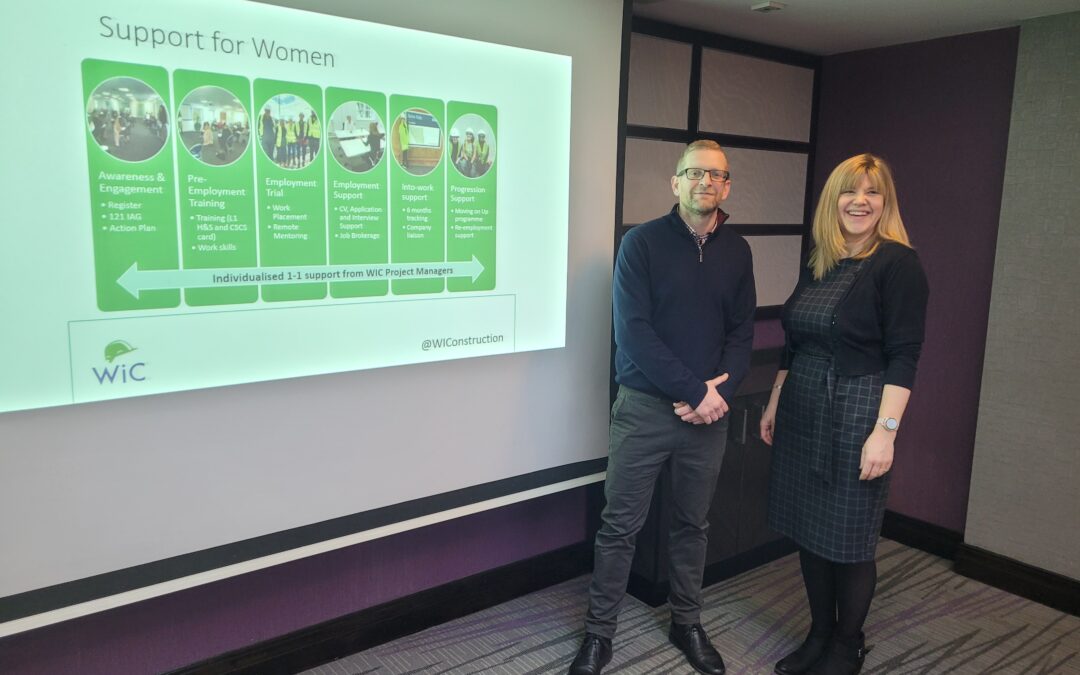
by Clair Mooney | 22 Mar, 2022 | Fairness, Inclusivity and Respect (FIR)
To encourage active collaboration, inclusivity and support the delivery of a more diverse workforce, FIS is delighted to announce its collaboration with Women into Construction (WiC).
With less than 15% of the UK construction workforce represented by women – a figure that reduces to 1% for trade roles – this collaboration seeks to address the industry’s appalling record of attracting and employing women. It will challenge the sector to overcome barriers and improve the experience and strengthen the support network for women joining the finishes and interiors sector workforce.
The partnership will see FIS and WiC work to maintain regular communication on a wide range of industry issues which affect their respective memberships and look for opportunities to work on collaborative activities that complement and support their organisations.
FIS President and Operations Director at Tapper Interiors, Helen Tapper stated:
“It is encouraging to see FIS working more openly on diversity in our workforce. It is critical that we increase our appeal and overcome behaviours that have caused people to look past construction. Beyond the moral imperative, the labour and skills shortage is, without doubt, the most acute we have known. It would be nonsensical not to look at what we do to adapt and improve our recruitment processes and behavours to appeal to the widest possible group of people.”
Kath Moore, MBE – Managing Director Women into Construction says:
“We are delighted to collaborate with FIS to support increased diversity in the finishing and interiors sector. By raising awareness and opening up opportunities for women to find out about the wide range of roles available, we aim to challenge perceptions and encourage companies to look beyond traditional sources of labour to meet their skills needs. We look forward to our partnership with FIS to change the face of construction.”
Supporting women wishing to work in the construction industry, Women into Construction works with housebuilders and contractors to recruit highly motivated, trained women, helping to reduce skills gaps and create a more gender-equal workforce.
To find out more about Women into Construction, visit its website

by Clair Mooney | 18 Mar, 2022 | Building Safety Act
CPA Chief Executive Peter Caplehorn wrote to the DLUHC Secretary of State this week to provide an update on the status of our work with the minister’s Residents’ Voice and Levy team, and to share a number of observations relevant to any scheme brought forward to tackle the issues of funding and remediation. Peter also reaffirmed our willingness to work with the minister and his team to help bring about solutions to those issues and the wider building safety concerns.

by Clair Mooney | 18 Mar, 2022 | Main News Feed
There remain considerable uncertainties regarding the economic impacts of Russia’s invasion of Ukraine as well as the effects of tightening sanctions on Russia.
Whilst demand in the UK economy and construction currently remains robust, strengthening supply chain constraints and higher inflation will inevitably hit growth.
The extent to which this occurs will be dependent on the extent of the conflict and markets’ uncertainty surrounding its impacts, the duration of the conflict and the length of time at which energy costs remain at post-financial crisis peak levels.
This guidance note from the Construction Products Association looks at the potential ramifications on the construction supply chain.

by Clair Mooney | 18 Mar, 2022 | Sustainability
The construction sector has hit its first target in its campaign to drive carbon out of the sector.
Last year the Construction Leadership Council launched its CO2nstruct Zero industry-change programme with the aim of eradicating carbon from buildings and infrastructure.
The programme includes a Performance Framework to monitor progress and whether the industry is living up to its commitments.
There are 28 metrics included as part of the framework, covering issues including the reduction of embodied carbon in products, lowering the volume of waste produced by projects and boosting the number of carbon-retrofitted homes.
While some of these metrics will take years to achieve, the campaign has secured its first success, with 90% of planning, design and estimating professionals having access to the relevant Net Zero training and post qualification Continued Professional Development.
This early win is crucial as carbon awareness among designers is seen as an essential enabler for work to cut carbon elsewhere in the construction process.
The CLC has committed to updating the CO2nstruct Zero Performance Framework on a quarterly basis, with today’s publication being the second update. Other positive outcomes reported today include a steep jump in the number of heat pump installers (rising to 3,555) as well as a welcome increase in the number of properties with Energy Performance Certificates.
While this first success helps to sustain momentum, the CLC is clear that there is still a huge amount of work to do to secure the other targets in the framework. To support this the CLC will be launching a series of new initiatives in the coming months including an industry group to secure zero diesel sites, and a focus on funding and finance for retrofit, as well as continuing to work with and grow its current base of 150 supporting companies, a number of whom have a global footprint.
CLC Co-chair and Construction Minister Lee Rowley MP said: “2021 saw CO2nstruct Zero established with industry leaders and Government. 2022 will see us continue to develop and grow the programme, working with our growing network of Business Champions and Partners to co-ordinate and promote our collective progress and influence companies across the sector’s breadth and depth to join our journey”
Hannah Vickers, Programme Director for CO2nstruct Zero and Chief of Staff at Mace, said:
“Delivering a transformed construction sector that is fit for a net zero future will take a huge, collaborative effort from across the entire industry. Ensuring that we’re measuring our collective performance is a vital first step to enable that collaboration – and that’s why the progress we’ve tracked so far is so positive. These are the first steps on a long journey; but one that is crucial to our industry’s future.
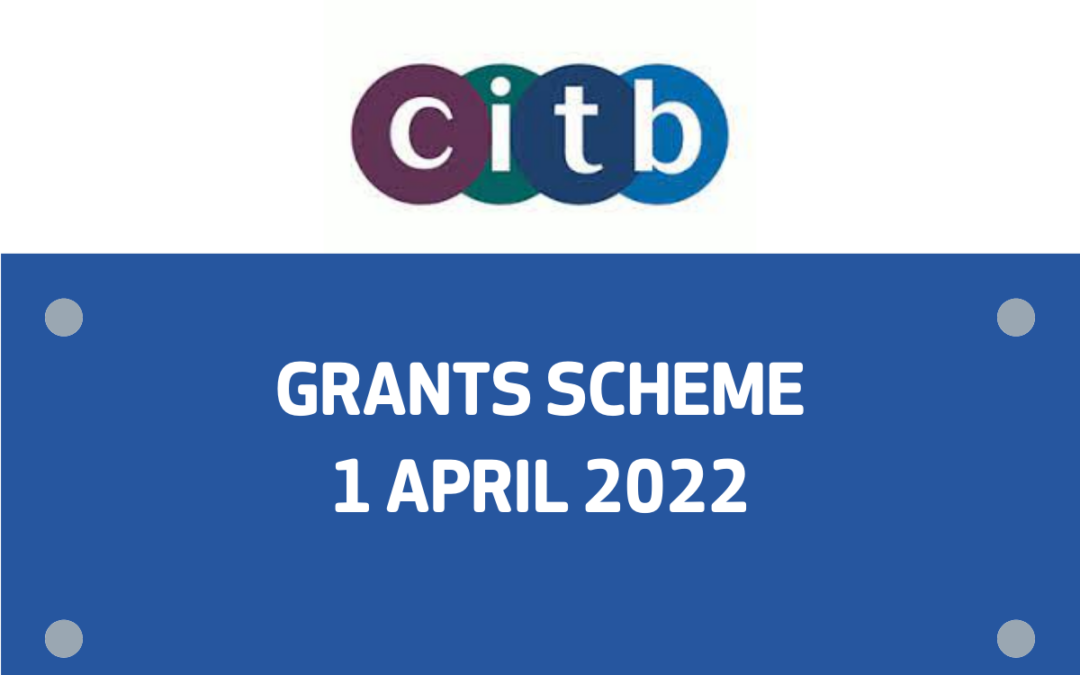
by Clair Mooney | 18 Mar, 2022 | Skills
From 01 April 2022 onwards for occupational Traineeships that are only available in England, a one-off CITB grant of £1000 will be available to employers after completion of an 8 to 10 week CITB Occupational Traineeship work placement. Occupational Traineeship are available in:
- Brickwork
- Carpentry and Joinery
- Drylining
- Painting and Decorating
Employers will be able to claim once the traineeship work placement is complete, the evidence required will be email confirmation from the college or certificate to include learner name, course title and completion date. Applications can be submitted to grant.claimforms@citb.co.uk. This grant payment will be in addition to the £1000 paid by government.
Employers can provide up to 10 work placements per region for Traineeships and it is felt this could be a route employers will use to identify their next apprentices. Individuals that have completed a Traineeship may be eligible for an accelerated apprenticeship as they will have already completed a lot of the training and this will reduce the time needed to achieve.
For employers taking on apprentices across the UK CITB will provide an enhanced grant of £2000, the initial £1000 will be paid with the first attendance quarterly payment, with the second £1000 paid with the final attendance payment.
This enhanced grant is for Apprentices who start the Dry Lining Framework or Standard Apprenticeship on or after 1 April 2022. The enhancement is automatically added where the employer is eligible at the same time as the attendance grant is processed. Eligible Apprenticeships:
- England – Level 2 Interior Systems Installer – Drylining Systems (IFATE Standard)
- Wales – Level 2 Interior Systems – Dry Lining knowledge qualification (ACW Framework)
- Scotland – SCQF Level 5 Dry Lining – Finishing/Fixing (SDS Framework)
If the Apprentice changes employer during their apprenticeship the payment will be made to the employer the apprentice is with at that time.
George Swann FIS Skills and Training Lead said:
“This clearly recognises that the core trades in the finishes and interiors sector are short of people and this is having a knock on effect through the entire construction industry. The additional CITB grants are welcome and should help to tip the balance in favour of action for some employers. Remember, if you decide to take on an apprentice or support a traineeship, you are not alone, FIS team is here to help. We’ll be covering how to access these grants and wider funding in our Regional Interventions throughout the Spring”.
New guidance on funding and business support in Scotland
On Tuesday, the Scottish Construction Leadership Forum (CLF) launched a new guide on the funding and business support available to industry. The guide is an action from the CLF Recovery Plan of actions aligned with the Scottish Government’s policies and the Construction Scotland Industry Strategy. The new guide has been produced by the Forum’s Digital Strategy Steering Group, following research by one of its members which showed a need to help businesses access support on digital upskilling.

by Clair Mooney | 16 Mar, 2022 | Health and Safety
A COVID-secure titled risk assessment is no longer legally requiredk however COVID-19 still presents a risk to the workplace which employers are required to manage in line with the Management of Health and Safety at Work Regulations 1992.
If FIS members already have a risk assessment in place, they’ll need to review the content and controls, as it is now over to employers to formulate a policy on employee self-isolation.
With the responsibility of keeping workplaces safe and COVID-secure now sitting even more heavily on the shoulders of employers, FIS Associate Member Citation has seen an increase in enquiries on how to manage COVID-risk. To help address this, they have created a free checklist covering everything employers need to know.
The free guide can be downloaded from https://tinyurl.com/fislearningtolive2022
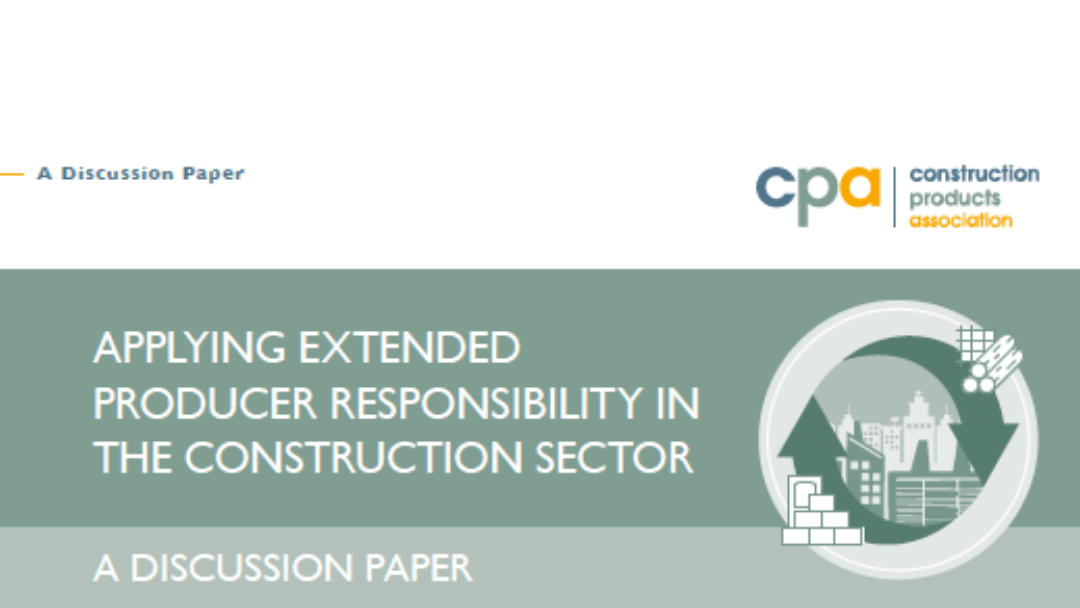
by Clair Mooney | 14 Mar, 2022 | Sustainability
The Construction Products Association has published a discussion paper on extended producer responsibility (EPR):
Applying EPR in the Construction Sector Discussion Paper (constructionproducts.org.uk).
This discussion paper seeks to explore the applicability of the concept of Extended Producer Responsibility (EPR) to construction products – is it applicable to all, to some, or no products at all? And whether any general principles to guide potential application can be identified.
EPR is applied in a variety of policies and regulations to transfer responsibility for management of waste products to the producer. Existing EPR schemes already exist to cover, for example, end of life vehicles (ELV) or waste electrical and electronic equipment (WEEE). This paper reflects on how EPR schemes have been applied in those sectors and how it might apply to the construction product sector – and to which products.
EPR can support better practice in the industry, such as minimising over ordering, increasing reuse or encourage high value recycling and could become one of the tools required to shift the industry towards a more circular economy approach – not the only tool.

by Clair Mooney | 11 Mar, 2022 | Main News Feed
To help clients and the industry to implement procurement practices that will deliver safer buildings post Grenfell, the Government has published guidance on collaborative procurement for design and construction to support building safety. Dame Judith Hackitt and other speakers will be formally launching the guidance at a free online event on Monday 28 March between 2-4pm.
The New Hospital Programme (NHP), which is developing 48 hospitals by 2030, has published its first commercial pipeline to give suppliers visibility of current and future contract opportunities. It provides information on proposed projects up to 2024, including estimated contact value, start date, length and sourcing route.






